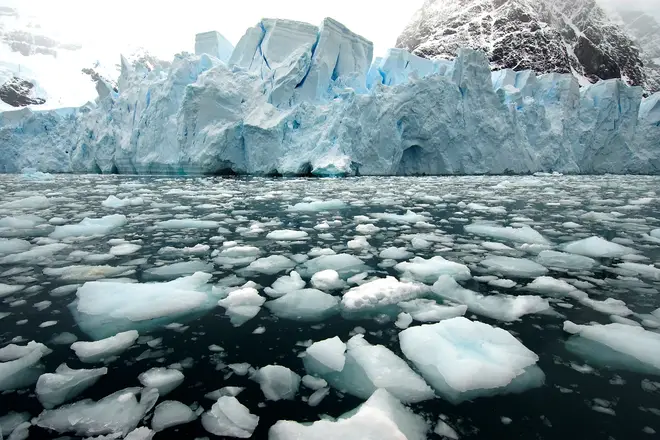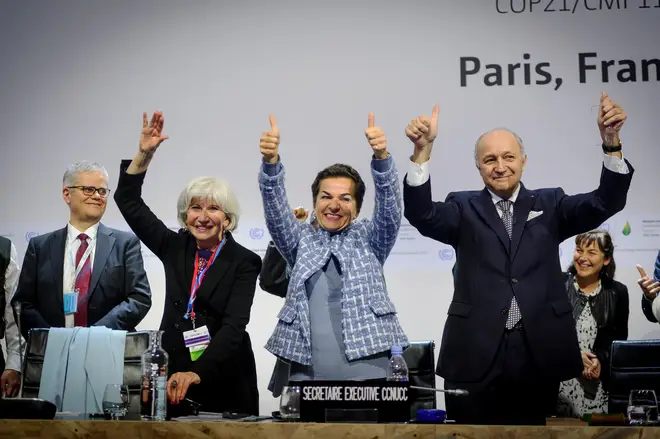
Ian Payne 4am - 7am
10 November 2021, 14:52

The 2015 Paris agreement saw 196 countries make a legally-binding commitment to limiting global warming to within 1.5C of pre-industrial levels - but why is this the magic number?
The Paris agreement was signed by 196 counties at COP21, held in Paris in 2015.
It is a legally binding agreement to limit average global warming to well below 2C - preferably 1.5C - when compared to CO2 levels before the industrial revolution.
Read more: What is COP26 and why does it matter? A complete guide to the key climate summit
Read more: COP26: Businesses face uncertainty as streets locked down ahead of summit
In order to achieve this goal, countries will take increasingly ambitious climate action - revised on a cycle every five years - known as nationally determined contributions (NDCs).
Countries were due to submit their NDCs at COP26 in 2020 - but because of the delay caused by the coronavirus pandemic, those NDCs are now due at the summit in a few weeks' time.

The Paris agreement pledges to keep warming within 1.5C because, whilst this temperature increase would have some impact, it would avoid the catastrophic effects that a 2C rise would likely see.
If there was an increase of 2C, a third of the world's population would be "regularly" exposed to severe heat. This would cause an increase in heat-related deaths and a rise in some health problems.

Boris Johnson: 'Cop26 is a turning point for the world'
An increase of 2C would also be disastrous for our natural world. Almost all warm water coral reefs - which, among other things, act as a habitat for many species and a buffer for storms - would be destroyed.
The Arctic sea ice would melt completely for at least one summer each decade, and the irreversible loss of ice sheets in Greenland and the Antarctic could cause sea levels to rise by several metres over the next few centuries. This would have a huge impact on wildlife and human communities alike.
Read more: COP26: What could be decided at the key climate summit?
A rise of 1.5C, however, would see impacts that are still serious but not as severe. The risks of food and water shortages, hampered economic growth, extinctions, and knock-on impacts on human health would all be reduced.
In an ideal world we would have no increase in temperatures. However the key pledge of the Paris agreement recognises the huge changes that countries have to make in order to control global warming, and acknowledges these changes will not happen quickly enough to result in no increase in the global average temperature.

Cop26 Five graphs that show the reality of climate change
The agreement also recognises the fact that processes causing global warming are already set in motion. Many of the impacts of warming have knock-on effects that contribute to further warming.
Because of this positive feedback, even if we stopped producing all fossil fuels tomorrow it would still take a while for the earth to stop warming. The Paris agreement accounts for this by accepting that some warming is inevitable.
However, the latest scientific models show that if we did achieve net-zero CO2 emissions, atmospheric carbon will eventually decline and there would be no further temperature increase beyond that point.
No - in fact, we're quite a long way off.
The UN warned on Tuesday that, even with updated promises being made across the globe, the world is currently on track to experience warming of 2.7C by 2100.
Read more: Global plans to avert climate change not enough to avoid 'endless suffering' - UN
Read more: Boris Johnson: 'Touch and go' whether COP26 summit will be a success
Failure to reach 1.5C goal will cause "a destabilised world and endless suffering", according to Patricia Espinosa, executive secretary of the United Nations Framework Convention on Climate Change.
She added: "We are nowhere near where science says we should be."
It means the stakes are even higher, and the success of COP26 all the more vital.
As the report was released, UN secretary-general Antonio Guterres urged countries to come to Glasgow with "bold, time-bound, front-loaded plans to reach net zero", eliminating emissions from every sector and providing climate finance for poor countries.